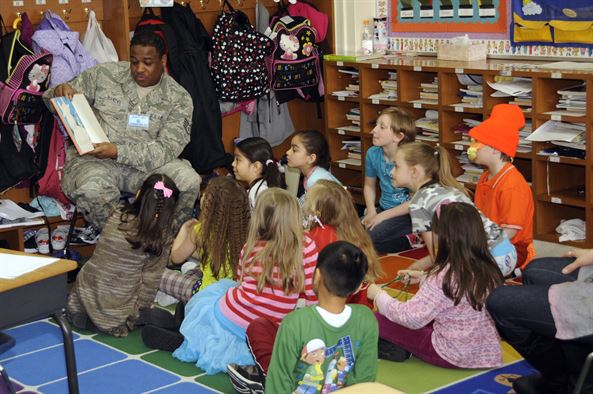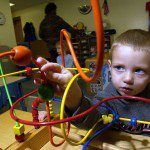![https://commons.wikimedia.org/wiki/File%3AUS_Navy_050114-N-3659B-050_he_Morale_Welfare_and_Recreation_Child_Development_Center_on_board_Naval_Support_Activity_Mid-South_in_Millington%2C_Tenn.%2C_provides_daycare_services.jpg; By U.S. Navy photo by Photographer’s Mate 3rd Class Joseph M. Buliavac [Public domain], via Wikimedia Commons](https://wp-media.patheos.com/blogs/sites/533/2016/05/1024px-thumbnail-1024x667.jpg)
It’s baa-aack — the dream that we have a way of fixing poor kids right at our fingertips, a solution that just needs a cash infusion, not a change in behavior or new ideas or insights. All we need is to put those kids, from perhaps infancy on, into daycare, cared for by highly-trained experts. (OK, that’s a bit of a straw man, but allow me to vent anyway.)
This time, in the form of a New York Times column by Nick Kristof, “Too Small to Fail.” He writes,
If we want to get more kids in universities, we should invest in preschools.
Actually, preschool may be a bit late. Brain research in the last dozen years underscores that the time of life that may shape adult outcomes the most is pregnancy through age 2 or 3.
“The road to college attainment, higher wages and social mobility in the United States starts at birth,” notes James Heckman, a Nobel-winning economist at the University of Chicago. “The greatest barrier to college education is not high tuitions or the risk of student debt; it’s in the skills children have when they first enter kindergarten.” . . .
“It is in the first 1,000 days of life that the stage is set for fulfilling individual potential,” writes Roger Thurow in his powerful and important new book on leveraging early childhood, “The First 1,000 Days.” “If we want to shape the future, to truly improve the world, we have 1,000 days to do it, mother by mother, child by child.”
Now, I’m a bit surprised the Kristof still pushes the goal of college attendance, but let’s assume that he means that as a proxy for “overall success in life” — that is, having kids reach their adult years with the skills and temperament that enable them to succeed, not just staying out of jail and out of trouble but holding down jobs that enable them to provide for their families, and able to form those families and have healthy relationships with others. (Incidentally, for my take on the “is college worth it question?” see this old post.)
Now, for many years, the Left pointed to two classic studies to stake their claims for the magical properties of “high quality” daycare for poor children: the Perry and Abecedarian studies. (Here’s some context; lots more to read via google.) In the time since these occured in the 70s, the long-term outcomes have been intensely debated, but it has been pointed out multiple times that these two studies are not scalable. You can’t replicate projects with dedicated teachers who are proud of being a part of something new, and expect that you can create the same conditions all across America. What’s more, both these projects involved extensive intervention on the part of social workers with the families.
Now we’ve got more recent research, in the form of a study on a preschool program in Tennessee which showed that putting kids in 4-year-old preschool didn’t improve outcomes.
And further studies (linked to in this recent article) show that the more time kids spend in daycare, the more likely they are to experience behavioral problems. (Disclosure: my kids were in daycare, for somewhere between 20 – 30 hours a week.)
But — heck, at the same time: daycare for children in poor families is generally not about forming those young minds. Most of the time, it’s about getting the (presumably single) mother into a job.
Image: https://commons.wikimedia.org/wiki/File%3AUS_Navy_050114-N-3659B-050_he_Morale_Welfare_and_Recreation_Child_Development_Center_on_board_Naval_Support_Activity_Mid-South_in_Millington%2C_Tenn.%2C_provides_daycare_services.jpg; By U.S. Navy photo by Photographer’s Mate 3rd Class Joseph M. Buliavac [Public domain], via Wikimedia Commons












